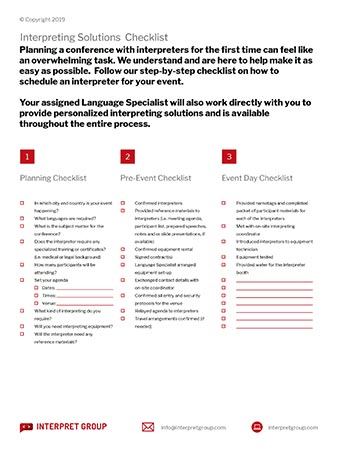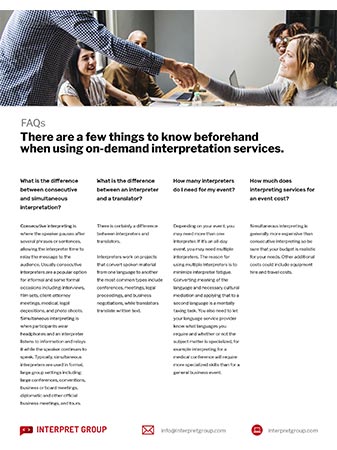Artificial intelligence (AI) has made remarkable progress in translation and speech recognition. From quick text translations to voice assistants that bridge everyday conversations, AI-powered tools have become highly effective for casual communication. They are excellent for low-stakes situations, such as getting the gist of a news article in another language, confirming an appointment, or asking for directions while traveling.
But when it comes to high-stakes interpretation like court hearings, medical consultations, and corporate negotiations, the margin for error is razor thin. In these circumstances, communication depends on nuance, trust, and human judgment. A single mistranslation can shift meaning, change outcomes, or even put lives at risk.
The use of AI in interpreting also carries significant risks regarding privacy and confidentiality. Sensitive conversations—whether in business, legal, or diplomatic contexts—may be exposed to data storage, processing, or transmission outside secure environments. Unlike professional interpreters, who are bound by strict codes of ethics and confidentiality, AI systems cannot guarantee the same level of discretion or control over how information is handled.
This is why, despite AI’s tremendous progress, professional interpreters remain indispensable in the quest for true understanding.
The Limitations of AI in High-Stakes Interpreting
Nuance and Context
AI translation excels at word-for-word conversion, but language is rarely that simple. Idioms, cultural references, and ambiguous phrasing can completely change meaning depending on context. While AI models may stumble, a trained interpreter can instantly recognize and clarify intent, ensuring that nothing gets lost between languages. Interpreters don’t simply translate words; they also interpret meaning with the broader social and cultural framework of the conversation. This human ability to discern nuance ensures that messages are not only accurate, but also appropriate and respectful.
Emotional Intelligence
Interpreting is not merely about words, but also about tone, empathy, and sensitivity. In medical discussions about a patient’s condition or legal proceedings involving vulnerable witnesses, interpreters navigate delicate emotions. AI cannot yet interpret empathy or adjust tone to reflect compassion. Human interpreters provide the emotional intelligence that machines lack, responding in real time to the speaker’s mood and the listener’s needs. This emotional awareness builds trust between all parties, something technology cannot replicate.
Legal and Technical Precision
In fields such as law, finance, and healthcare, a single mistranslated term can have far-reaching consequences. AI may misinterpret specialized terminology or use an imprecise equivalent, leading to costly misunderstandings. Professional interpreters undergo years of training to master technical vocabulary and guarantee absolute accuracy. They can distinguish between similar terms with very different legal or medical implications, protecting clients from mistakes that could derail a case, contract, or diagnosis. This level of precision is what separates professional interpretation from automated translation.
Adaptability
Conversations rarely unfold in a straight line. People interrupt, speak over one another, shift topics, or use strong accents and colloquialisms. While AI often falters in these dynamic situations, human interpreters can adapt instantly, keeping communication clear and coherent in real time. They can ask for clarification, adjust to unexpected turns, and recover gracefully if information is incomplete. This flexibility faciltitates a smooth flow of communication even in unpredictable or high-pressure environments.
The Power of Human Understanding
Adapting to Human Interaction
Interpreters read not only words but also body language, facial expressions, and intent. These subtle cues guide them in delivering messages faithfully, even when the speaker’s tone or gestures alter meaning. Machines cannot replicate this level of human awareness. Interpreters draw context beyond the spoken word, preserving the emotional weight of a message is preserved and not flattening it into a literal translation.
Managing Complexity
High-stakes conversations are rarely linear, and they often involve layers of meaning that go beyond the words being spoken. Human interpreters are adept at handling this complexity by juggling multiple demands at once: specialized jargon, varying levels of formality, and the differing expectations of participants. Unlike AI, which processes inputs in isolation, interpreters synthesize all these elements into a coherent whole. They can distinguish between what must be translated verbatim, what requires explanatory framing, and what cultural or contextual nuances must be highlighted. This ability to manage layered communication ensures that messages retain both accuracy and depth, even when the subject matter is technical, sensitive, or abstract.
Cultural Sensitivity
Language is deeply tied to culture. A literal translation may sound accurate but can carry unintended offense or confusion. Human interpreters understand cultural context and adjust their wording to preserve respect and clarity. For example, in some cultures, direct refusals may be considered impolite, and an interpreter will soften the phrasing to maintain harmony without altering the speaker’s intent. In other settings, a joke or proverb may be replaced with an equivalent expression that resonates with the listener’s cultural background, ensuring that the message lands as intended. Interpreters act not just as linguistic experts but as cultural mediators, bridging entire worldviews to create understanding where machines would only deliver words.
Our Commitment to Human Expertise
AI has its place in modern communication. It is useful, even powerful, for low-risk scenarios where speed and convenience matter more than precision. But in high-stakes fields such as law, medicine, and global business, the risks of error are too great to entrust solely to machines.
At Interpret Group, we recognize both the promise and the limits of AI. That is why we carefully select interpreters not only for their linguistic mastery but also for their professionalism and reliability. Our interpreters uphold confidentiality, accuracy, and trust across every assignment—qualities that no algorithm can replace.
Critical conversations require more than translation; they require proven expertise. Partner with Interpret Group today to deliver your message with accuracy and integrity, every time.









